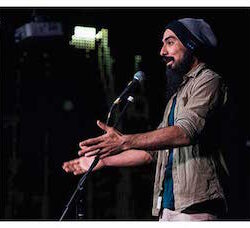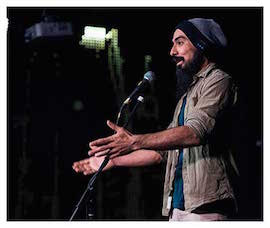
Erfan Daliri, a 2011 graduate at the Centre for Communication and Social Change, University of Queensland, is an author, speaker, artist, educator, mentor, event director, and agent of social change. The Centre had a chat with him about the Newkind Festival, as well as his events production company (with the soul of a social movement) UpUpTrampoline. In this article, Daliri’s lifelong interest in using the arts to orchestrate social change is uncovered.
Erfan Daliri’s Newkind Festival, created through his events production company UpUpTrampoline is the culmination of a lifetime believing in art as an agent to social change.
The festival, which will be held in Tasmania, in March 2018, assembles thought leaders, innovators, educators and artists to participate in empowering lectures, discussions and workshops, all with the end goal of meaningful social change.
To Daliri, this mix of the arts and social change in his life seemed inevitable.
“I was born into it. My father was using theatre to educate remote Indian communities before I was even born,” he said.
“Both of my parents have lived lives of service to others, working in community development, youth work and refugee settlement.
“It’s not something that I ever had to contemplate, I always knew what was important and what was not.
“Social change, community service and the betterment of the world was always a core drive in our family, and the arts was a very obvious tool for this.”
Daliri sees the arts as a way of breaching barriers to social change through a framework that can easily adapt to pre-existing methodologies.
“The arts can express ideas and concepts that people may not be able to, or perhaps even willing to accept intellectually,” he said.
“Film, theatre, music, literature and art, have a way of allowing people to feel like they worked something out for themselves.
“They also offer a way of broadcasting and sharing ideas in a way that is palatable to even the illiterate.
“Most importantly we can use events and arts to create new stories and alternate realities that allow for visceral learning, embedding ideas and behaviour changes even deeper in people’s minds.
“The difference between a powerful and effective speech is the craftsmanship that goes into the sentence structure, which is the poetry of it.
“The impassioned and perfectly timed manner in which it is presented to the audience, which is the theatre of it.
“And then the filming, editing and further broadcasting of that content which is the story-telling and choreography of it. It is all art.”
Newkind is built on this philosophy. It uses art to discuss difficult ideas and abstract concepts, and encourages attendees to undertake immediate social change action, while discussing new ideas.
“We can’t just talk about environmental awareness and sustainability if we are still using unnecessary packaging, consuming meat and dairy, and not making use of renewable energy to power the event,” he said.
“We genuinely wish to change the world and personal integrity is where we begin.
“An environmentalist cannot justify buying water in a plastic bottle at an environmentally ‘conscious’ event.
“Newkind is part environmental summit, part architecture conference, part anarchist summer school, part physical health and well-being festival and part prepper survivalist boot camp.
“We gather together to train, to learn and to look under the hood of society so we can discuss, investigate and implement a new reality.”
According to Daliri, the festival and UpUpTrampoline are heavily based upon ideas he investigated at the centre with Associate Professors Elske van de Fliert and Pradip Thomas.
“My time at UQ was pivotal and instrumental in the work that I now do,” he said.
“Looking at social change theory, its historical context, current applications, and the unravelling of contradictions within it is what allowed me to stop, reassess and move forward with such conviction and clarity.”
Building Newkind and UpUpTrampoline has not been easy though. The biggest challenge is low funding.
“Literally just doing the work for months and months on end and not waiting for money to come in or for anyone to pay you,” he said.
“That can be quite a challenge, and potentially a stumbling block for many.”
But, Daliri’s determination sees the Newkind Festival back for another year.
“The fact that despite the challenges, the setbacks and the improbability of it all, we actually managed to make it happen… I’d say I’m quite pleased with that,” he said.
And, despite the hurdles he couldn’t be satisfied doing anything else.
“My work philosophy is nothing new,” he said.
“To do what you love and love what you do.
“To not ever consider what the financial exchange might be when considering a job, a contract or deciding between two actions.
“To work harder than anybody ever expects you to work and expect nothing in return.
“There is no honour in careers or bank balances, there is only honour in service.
“If we all did what we loved for the love of doing it, and never sought to ‘get ahead’ of others, the world would be halfway to being sustainable and at peace.”
For more information on Newkind 2.0 visit www.newkindfestival.com.
*Reposted from the Centre for Communication and Social Change, University of Queensland website

